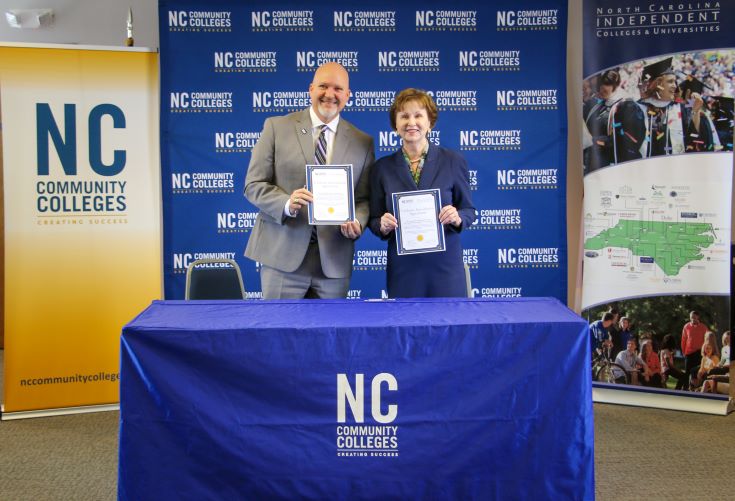NC Community College System, NC Independent Colleges and Universities sign transfer agreement for Early Childhood Education pathway

Published: August 22, 2023
Early Childhood educators with associate degrees from North Carolina community colleges will now have seamless transfer opportunities to many private North Carolina four-year colleges. The opportunities result from Friday’s signing of a joint agreement by the State Board of Community Colleges and North Carolina Independent Colleges and Universities (NCICU).
The State Board of Community Colleges approved the proposal for a Uniform Articulation Agreement between North Carolina Independent Colleges and Universities (NCICU) and the North Carolina Community College System at the August 18 board meeting – expanding transfer opportunities for students pursuing careers in early childhood education.
The agreement promotes educational advancement for students enrolled in the Associate in Applied Science in Early Childhood Education (ECE) program at community colleges that want to earn a Bachelor’s Degree in Birth-Kindergarten (BK) teaching licensure program or a Bachelor’s Degree in a related Early Childhood Education Field from select independent colleges and universities in the state.
“Early Childhood and Birth to Kindergarten are critical stages in children’s development. We want to ensure our North Carolina teachers in these vital areas receive the best education to be able to help children learn and grow,” said Dr. A. Hope Williams, president, North Carolina Independent Colleges and Universities. “NCICU is pleased to approve this articulation agreement with the North Carolina Community College System to enrich and streamline support and increase transfer options for these teachers.”
The agreement will increase opportunities for applied associate degree early childhood educators who wish to earn baccalaureate degrees and create a more seamless – and guaranteed – transfer process for community college early childhood education students.
“This is a milestone day for our system and for our state,” said Dr. Lisa Eads, Associate Vice President of Programs at the North Carolina Community College System. “There is a critical need for early childhood professionals in North Carolina. With the signing of this agreement between NCCCS and NCICU, we are demonstrating our commitment to early childhood professionals serving children and families in our state.”
This coordinated approach should increase ECE to BK student retention and persistence and reduce time-to-degree completion. The agreement will increase the number of teachers with four-year degrees with a BK licensure and support non-teaching positions that may not require licensure, including Smart Start, Head Start, Department of Health and Human Services, and other public, private or non-profit organizations.
Students are required to meet applicable admissions criteria for the institution of their choice, including but not limited to minimum GPA and Praxis scores (only required for teacher license track).
“The North Carolina Community College System is dedicated to building talent pipelines for critical professions and industries in our state and early childhood is certainly a vital need for our state and our economy,” said System President Jeff Cox. “Our mission is to make it as easy as possible to get high-quality education and preparation for these careers.”
For many years, NCICU and the System have been working together to increase opportunities for transfer students, and this agreement is a product of that collaborative work. All 58 community colleges are approved to offer this program and are included in this agreement.

About North Carolina Independent Colleges and Universities
North Carolina Independent Colleges and Universities (NCICU) is the statewide office of private, nonprofit higher education. These 36 colleges and universities include liberal arts, comprehensive and major research universities, Historically Black Colleges and Universities, colleges for women, and minority-serving institutions, plus significant numbers of graduate and professional school programs. NCICU colleges and universities enroll nearly 86,000 students from all 100 counties in North Carolina, 50 states, and from countries around the world. NCICU institutions award one in four bachelor’s degrees and one in three graduate and professional degrees in North Carolina.
